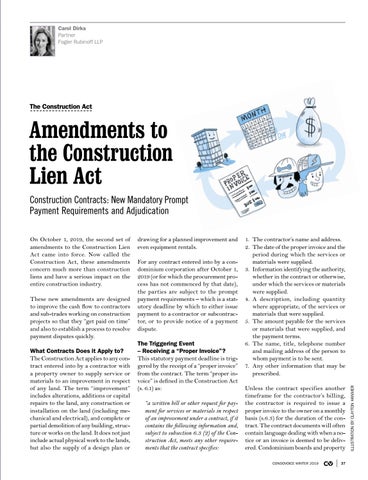Carol Dirks Partner Fogler Rubinoff LLP
The Construction Act
Amendments to the Construction Lien Act Construction Contracts: New Mandatory Prompt Payment Requirements and Adjudication
These new amendments are designed to improve the cash flow to contractors and sub-trades working on construction projects so that they “get paid on time” and also to establish a process to resolve payment disputes quickly. What Contracts Does it Apply to? The Construction Act applies to any contract entered into by a contractor with a property owner to supply service or materials to an improvement in respect of any land. The term “improvement” includes alterations, additions or capital repairs to the land, any construction or installation on the land (including mechanical and electrical), and complete or partial demolition of any building, structure or works on the land. It does not just include actual physical work to the lands, but also the supply of a design plan or
drawing for a planned improvement and even equipment rentals. For any contract entered into by a condominium corporation after October 1, 2019 (or for which the procurement process has not commenced by that date), the parties are subject to the prompt payment requirements – which is a statutory deadline by which to either issue payment to a contractor or subcontractor, or to provide notice of a payment dispute. The Triggering Event – Receiving a “Proper Invoice”? This statutory payment deadline is triggered by the receipt of a “proper invoice” from the contract. The term “proper invoice” is defined in the Construction Act (s. 6.1) as: “a written bill or other request for payment for services or materials in respect of an improvement under a contract, if it contains the following information and, subject to subsection 6.3 (2) of the Construction Act, meets any other requirements that the contract specifies:
1. The contractor’s name and address. 2. The date of the proper invoice and the period during which the services or materials were supplied. 3. Information identifying the authority, whether in the contract or otherwise, under which the services or materials were supplied. 4. A description, including quantity where appropriate, of the services or materials that were supplied. 5. The amount payable for the services or materials that were supplied, and the payment terms. 6. The name, title, telephone number and mailing address of the person to whom payment is to be sent. 7. Any other information that may be prescribed. Unless the contract specifies another timeframe for the contractor’s billing, the contractor is required to issue a proper invoice to the owner on a monthly basis (s.6.3) for the duration of the contract. The contract documents will often contain language dealing with when a notice or an invoice is deemed to be delivered. Condominium boards and property CONDOVOICE WINTER 2019
CV
37
ILLUSTRATION BY CLAYTON HANMER
On October 1, 2019, the second set of amendments to the Construction Lien Act came into force. Now called the Construction Act, these amendments concern much more than construction liens and have a serious impact on the entire construction industry.
